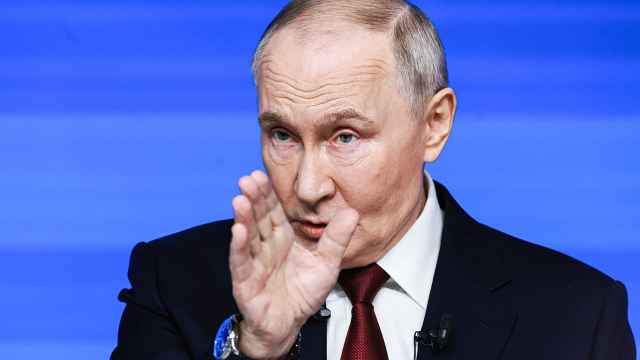Editor-in-chief Aleksei Venediktov and deputy editor Vladimir Varfolomeyev announced Feb. 15 that they would resign from the board in protest at the ousting of independent board members Yevenii Yasin, a liberal economist, and lawyer Alexander Makovsky, by lead shareholder Gazprom Media. Venediktov and Varfolomeyev will stay on at the station as journalists.
Varfolomeyev said he hopes the board changes will not mean an end to the station as an opposition broadcaster.
"Luckily the editorial policy of the station is defended by a charter, which is defined by the general director," he told Interfax. "They [members of the board] cannot influence what and how we speak and that is the reason for my optimism."
The station's general director Yury Fedutinov will be joined on the board, which now contains no journalists, by Vladimir Semyonov, director of government-controlled media group Svyazinvest, and Yevgeny Trubin, former head of the Lenizdat publishing house.
Other members of the new board include Nikolai Senkevich and Igor Goikhberg, general director and deputy director respectively of Gazprom Media Holding; Gazprom Media deputy financial director Yelena Kaptur; Gazprom Media deputy legal director Yan Pisunov; chairman of TV channel NTV Plus Dmitry Samokhin; and lawyer Alexander Berezin.
Varfolomeyev wrote on his LiveJournal blog that the "balance of power is already different; the people are somewhat different."
He added that the decision for the ouster was likely to try to make the station less opposition-oriented.
"In my view, this decision is mostly likely political. In other words, the country's leadership is not happy with Ekho's work and asked the controlling media-holding to, as they say, 'tighten the leash,'" he wrote.
Venediktov said on air in February that the board will not be able to directly influence editorial content but they will be able to influence the makeup of the staff.
"It will be easier to fire the editor-in-chief," he said.
Putin spokesman Dmitry Peskov told Interfax that the changes have no relation to Vladimir Putin not liking the station, which in January he accused of "spewing diarrhea [on him] day in and day out."
Venediktov said in February that he did not think that Putin was behind the move and speculated that it was people below him interpreting his words as an order to crack down.
"The thing is that when Putin started to publicly criticize the station, many zealous officials took this as an order to attack," he said. "Putin did not issue such an order."
Gazprom Media, a subsidiary of state-owned energy giant Gazprom, owns 66 percent of the company, with the remaining 34 percent owned by the staff.
A Message from The Moscow Times:
Dear readers,
We are facing unprecedented challenges. Russia's Prosecutor General's Office has designated The Moscow Times as an "undesirable" organization, criminalizing our work and putting our staff at risk of prosecution. This follows our earlier unjust labeling as a "foreign agent."
These actions are direct attempts to silence independent journalism in Russia. The authorities claim our work "discredits the decisions of the Russian leadership." We see things differently: we strive to provide accurate, unbiased reporting on Russia.
We, the journalists of The Moscow Times, refuse to be silenced. But to continue our work, we need your help.
Your support, no matter how small, makes a world of difference. If you can, please support us monthly starting from just $2. It's quick to set up, and every contribution makes a significant impact.
By supporting The Moscow Times, you're defending open, independent journalism in the face of repression. Thank you for standing with us.
Remind me later.





